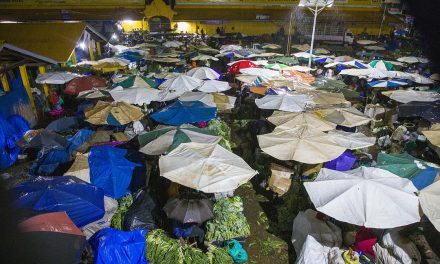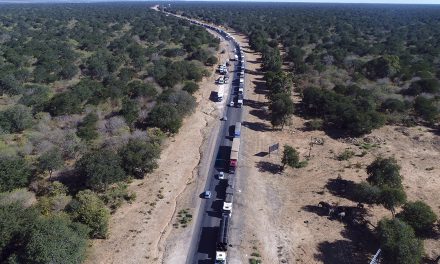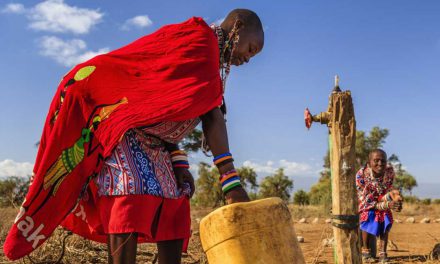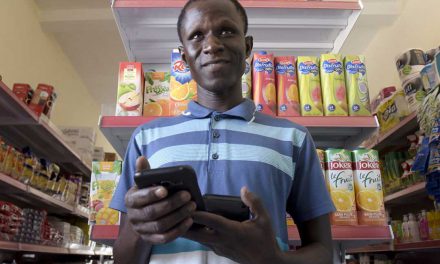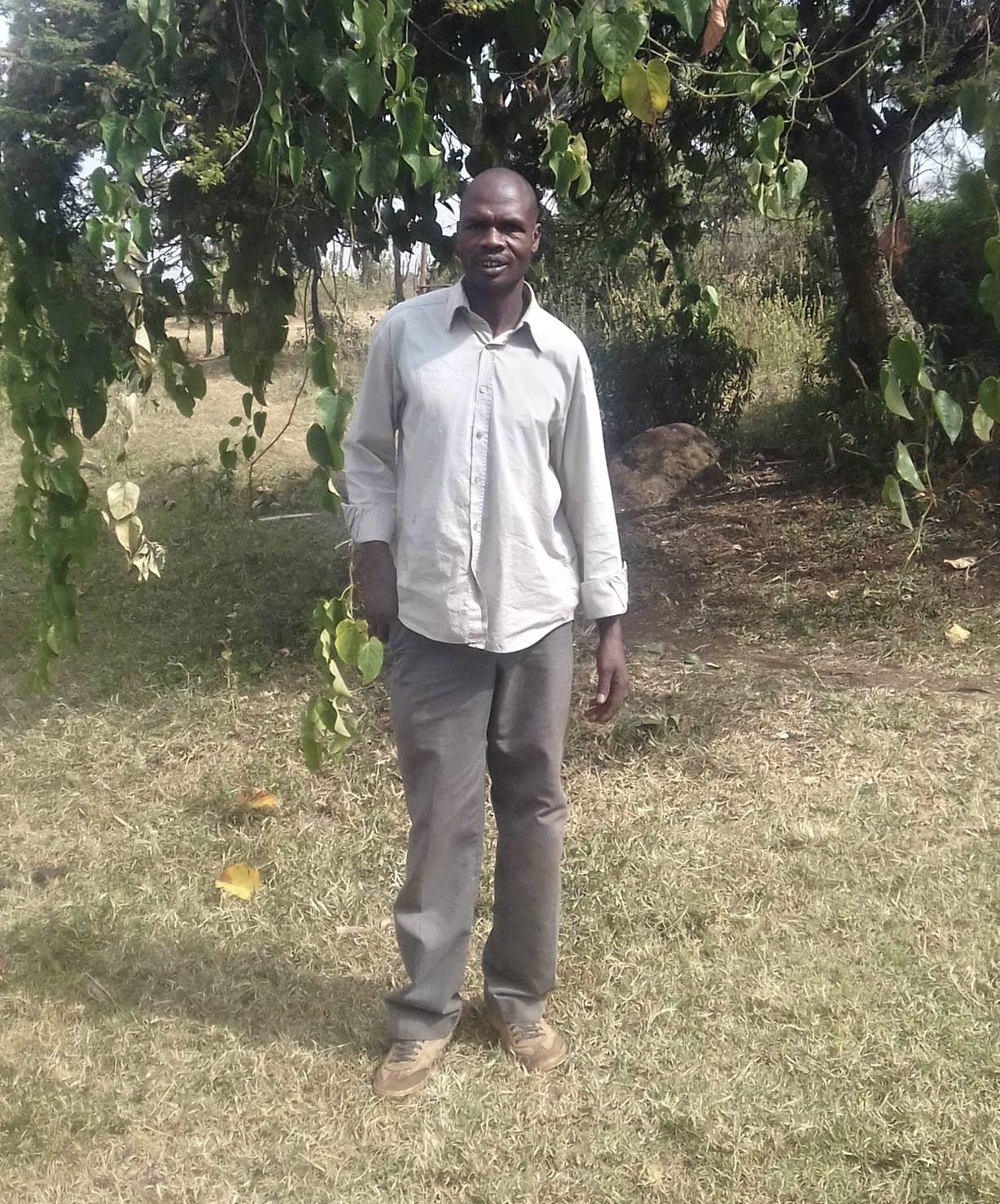
Former supermarket teller Friday Ochieng’, who lost his job due to COVID-19. Photo: Mark Kapchanga
Pushed to the limit, Friday Ochieng’ fixed his eyes to the ceiling of his home. He felt like crying but he could not; in his Luo culture, it is taboo for a grownup man to weep. A month earlier, the father of five had buried his wife after she lost a decade-long battle with sickle cell anaemia. Ochieng’ did not know where to turn. Schools were almost due to open, and he needed at least Ksh120,000 (about $1,000) for tuition fees for his children; two of them sitting for national examinations in primary and secondary schools.
While he thought – hard and deeply – about where to turn, the family were dealt another blow. The 45-year-old’s raggedy Nokia 106 phone rang. It was a text message. He thought it was a message via M-PESA, a mobile phone-based money transfer service, from wellwishers from whom he had sought help. It was not. “Due to the COVID-19 pandemic, the organisation has decided to relieve you of your duties with immediate effect,” the message read. The message, on Friday, 21 August, 2020, went on: “You are required to clear with your department before the payment of your terminal dues. We thank you for the years of service. Best wishes in your endeavours.”
Ochieng’s eight-year tour of duty as a supermarket teller in Migori, western Kenya, had come to an end. “They did not even give me more time to mourn my wife. It was a painful experience that I will never forget.” Evans Kidero, the former governor of Nairobi, says his personal experience of the pandemic spelt a turning point in his life. He says he got vaccinated against the virus on Monday, 29 March, 2021, but three days later got COVID-19 symptoms.“As a family, we all had COVID-19 tests done. The results for everyone except mine were negative. I had to proceed with complete isolation for two weeks,” he says. “This thing is not a joke.”
Indeed, Moses Njagi, a former parliamentary reporter for The Standard, Kenya’s oldest print outlet, says he is lucky to be alive after a tough battle with the virus. “I imagined leaving my children to live without a father, without a breadwinner … I even tried telling the doctor to allow me to make the last call (before dying).” Njagi recalls that what started as a slight cough spiralled into something serious on 20 July, 2020, when he was wheel-chaired into the intensive care unit at the MP Shah Hospital in Nairobi for a week. “It was a difficult 11-day journey. I am lucky to be alive. I never imagined I would be one of the statistics.”
Meanwhile, Wanjohi Munuhe, a public transport proprietor in Nyeri, central Kenya, tearfully describes how the pandemic has not only led to the crumbling of his 28-year-old empire, but a total dismantling of his family’s established social fabric. He explains that in adhering to the protocols associated with the pandemic, Matatus, Kenya’s popular public transport vehicles, have been forced to operate at half their capacity. On a day that he would normally make Ksh100,000 (about $6,775), Munuhe says he is now generating an average of Ksh22,000 (about $1,490), an 88% drop, from his 15-vehicle fleet business. The 54-year-old father of four’s business has been drastically reduced, he says, as people no longer move freely from one point to the other, hampered by curfews and lockdowns. Margaret Mwikali, a single mother of three, lost her job as an accountant in Nairobi, forcing her to relocate to her rural home in Makueni, 200 km from the capital.
She says she has nowhere to turn to for help. Her single-room, mud-walled and grass-thatched house is poorly ventilated, and there is no reliable, clean water connection nearby.“All my children have dropped out of school due to lack of fees,” she told Africa in Fact. “The small piece of land that I had, the only one for that matter, was sold at a throwaway price to cater for the medication of my last born who caught COVID-19.” Out of desperation, Margaret now relies on her relatives, well-wishers and local politicians to feed her children. When the first COVID-19 case was announced in Kenya in March 2020, the government issued a raft of measures that were aimed at checking its spread. This included disseminating accurate and verifiable information to empower citizens to make the right decisions.
Deputy President William Ruto, while addressing the country on 9 April, 2020, said information on the nature, threat and treatment of the virus “at this point in time, is the foremost duty of the government”. But Ruto added that in preparation for the possible escalation of numbers of COVID-19 cases from the hundreds into the thousands, the government had equipped hospitals, and was working with other counties – through the state-run Kenya Medical Supplies Authority (KEMSA) – to stockpile medical supplies. But this plan was soon derailed. As the coronavirus spread from urban to rural areas, so did the pilferage of funds and supplies meant to tackle COVID-19. KEMSA turned out to be at the centre of the theft, and its offices were declared a crime scene by the Directorate of Criminal Investigation in September 2020.
In an interview with Africa in Fact, Auditor General Nancy Gathangu said Kenyans lost Ksh2.3 billion (about $ 20,833,333) in the COVID-19 items procurement scandal at KEMSA. Investigations revealed that some of the companies awarded contracts were founded in January and February 2020, just a few months before the flotation of the tenders, a signal that there was collusion. “The procurement was not initiated based on need assessment and planning, resulting in over purchase of COVID-19 related stock worth Ksh6.3 billion (about $ 57,065,217),” said Gathangu.
So earth-shaking was the scandal that President Uhuru Kenyatta, on 31 August, 2020, ordered the country’s health ministry to publish details of all purchases made during the coronavirus outbreak. The president instructed Kenya’s Ethics and Anti-Corruption Commission to expedite its investigation into the KEMSA scandal. As a result, KEMSA’s Chief Executive Officer, Jonah Mwangi Manjari, and other top officials were forced to stand down, with Kenyatta promising to hold to account those responsible within 90 days. More than a year later and no suspect has been arrested to answer charges for the theft of the taxpayers’ money that could have saved hundreds of lives. But out of the pandemic in Kenya, positive stories have emerged, too.
Grace Wairimu, a secondary school teacher in Eldoret in Rift Valley, says COVID-19 presented her with a unique opportunity to start the business she had always dreamt of. She says when the pandemic outbreak was first discovered in Kenya, schools and institutions of higher learning were forced to close for almost a year. “This meant that parents had to look for ways of ensuring that their children had access to alternative forms of education. I thought about it, deeply, and came up with an idea,” she explains.
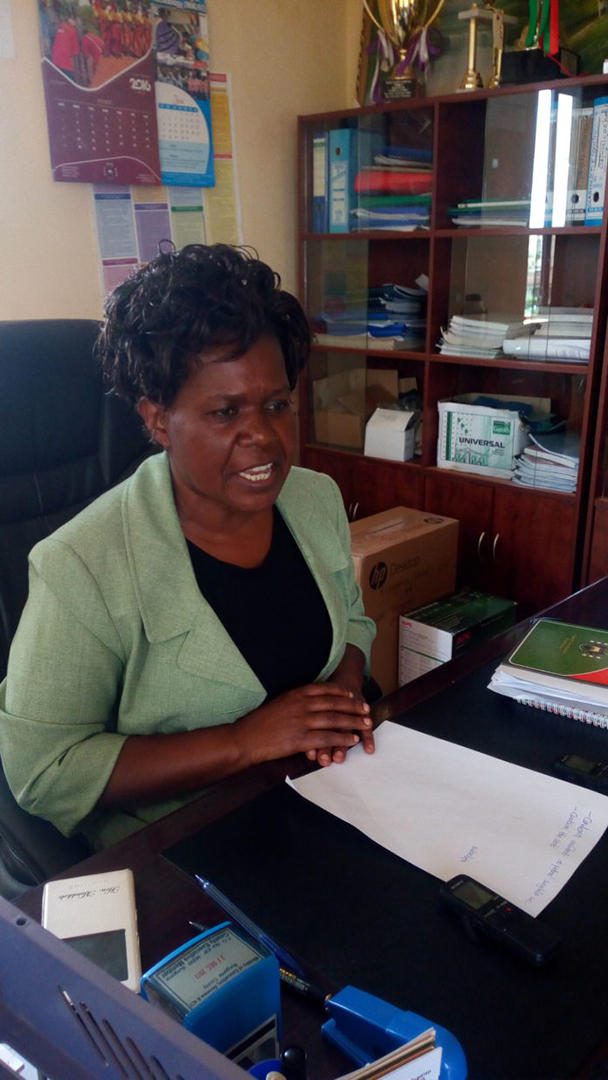
Teacher Grace Wairimu used lockdown to fulfil her dream of successfully founding a science education centre. Photo: Mark Kapchanga
Together with two friends, Wairimu launched an online teaching plan with a focus on candidates sitting for final examinations in primary and secondary schools.She says her attention was more on science subjects, which are traditionally seen to be tough ones, such as biology, physics, chemistry and mathematics.“We started as two teachers, offering tuition classes to Form Four candidates through Zoom. The initial enrolment was five in May 2020.” However, Wairimu says, the numbers quickly grew. By the end of June 2020 they had 35 students – 14 in primary school and 21 in secondary.
“This forced us to employ more tutors to cover the growing number of learners.” Today, the mother of three looks back with a smile. “The student numbers have now passed 150. For sure, COVID-19 has been a blessing in disguise. We have transitioned from a casual tuition-offering plan to a science education centre, which will soon be licensed as a school.”
Mark Kapchanga is a senior economics writer for the Standard newspaper
in Kenya and a columnist for the Global Times, an English-language newspaper
in China. He is pursuing a PhD in investigative business journalism at the
University of Nairobi.


